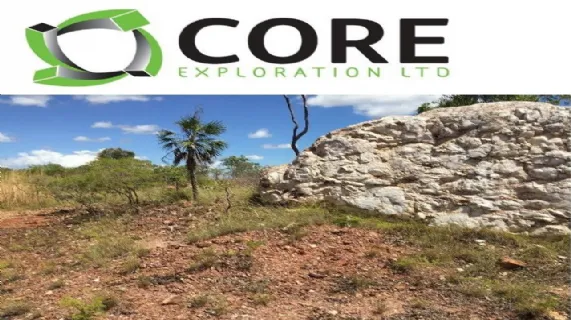 New Lithium Intersections at Lees-Booths Link Prospect
New Lithium Intersections at Lees-Booths Link Prospect
Adelaide, Nov 12, 2018 AEST (ABN Newswire) - Emerging Australian lithium developer, Core Exploration Ltd ( ASX:CXO) (
ASX:CXO) ( 7CX:FRA) ("Core" or the "Company"), is pleased to announce new exploration results for drilling between the Lees and Booths Prospects that supports the exploration model that the two prospects are geologically linked.
7CX:FRA) ("Core" or the "Company"), is pleased to announce new exploration results for drilling between the Lees and Booths Prospects that supports the exploration model that the two prospects are geologically linked.
HIGHLIGHTS
- Pegmatite intersections in all 10 step-out holes at Lees and Booths support the concept of continuous linking pegmatites between the two prospects
- Multiple pegmatites variable mineralised with spodumene intersected over 1,000m strike length
- Pegmatite widths of up to 23m and dipping at 45 degrees support potential for a low-strip ratio open pit mining operation
- Further infill drillholes planned to enable mineral resource estimation at Booths-Lees
- Booths-Lees Link interpreted to be a concealed pegmatite swarm with potential to materially up-scale the Finniss Project resource inventory
- Results expected throughout the remainder of 2018 from ongoing exploration drilling programs at the Finniss Lithium Project
Core recently announced that it had compiled evidence of a link between the lithium rich pegmatites at Lees and Booths and immediately commenced a RC drill campaign to test the model. Core's geologists had sufficient confidence to plan an additional 10-15 holes, of which, the Company has received results from the first 10 that have now been drilled.
All 10 holes contain at least one pegmatite intersection in the range 6-23m thick (Figure 1; Table 1). Most holes contain multiple intersections of pegmatite that can be tied with reasonable confidence to pegmatite intersections in holes along strike and down-dip. This has enabled the construction of a series of cross-sections perpendicular to the strike with a consistent geological pattern of NW-strike and 45 degrees dip to the NE (Figures 1, 2 and 3).
At this stage, each of these sections is constrained by at least two holes and mirror in many respects the better-constrained sections at the Lees and Booths prospects (Figures 2 and 3).
While there are currently no assay results received to date for the current round of drilling, based on visual estimates from drill chip samples and results from previous drilling, the pegmatites are expected to be variably mineralised with spodumene1.
Given the relatively shallow dip and apparent lateral consistency over 1km of strike, the Lees-Booths Link has the potential to significantly expand the lithium resource inventory at the Finniss Lithium Project in the Northern Territory.
Significantly, the discovery and delineation of a buried pegmatite swarm at Lees-Booths provides confidence that the Bynoe Pegmatite Field has other concealed spodumene pegmatite deposits, which Core will work methodically to discover and define to provide a production pipeline for the Finniss Project.
Commenting on the success of the exploration results, Core Managing Director, Stephen Biggins said:
"These exploration results demonstrate the potential to uncover large blind spodumene-rich pegmatite swarms at the Finniss Lithium Project. The historic pits and workings at Lees and Booths are likely to be just a small surface footprint of more extensive pegmatites buried under thin cover in the area.
The remainder of 2018 is shaping up to be a very busy one for Core as we continue to progress Grants towards development whilst examining the drilling data at a number of other prospects to bring these into the Project's resource inventory."
About Core Lithium Ltd
 Core Lithium Ltd (ASX:CXO) is an Australian hard-rock lithium company that owns the Finniss Lithium Operation on the Cox Peninsula, south-west and 88km by sealed road from the Darwin Port, Northern Territory. Core's vision is to generate sustained shareholder value from critical minerals exploration and mining projects underpinned by strong environmental, safety and social standards.
Core Lithium Ltd (ASX:CXO) is an Australian hard-rock lithium company that owns the Finniss Lithium Operation on the Cox Peninsula, south-west and 88km by sealed road from the Darwin Port, Northern Territory. Core's vision is to generate sustained shareholder value from critical minerals exploration and mining projects underpinned by strong environmental, safety and social standards.

![abnnewswire.com]()
Related Companies
Social Media
Share this Article

 ASX:CXO) (
ASX:CXO) ( 7CX:FRA) ("Core" or the "Company"), is pleased to announce new exploration results for drilling between the Lees and Booths Prospects that supports the exploration model that the two prospects are geologically linked.
7CX:FRA) ("Core" or the "Company"), is pleased to announce new exploration results for drilling between the Lees and Booths Prospects that supports the exploration model that the two prospects are geologically linked.  Core Lithium Ltd (ASX:CXO) is an Australian hard-rock lithium company that owns the Finniss Lithium Operation on the Cox Peninsula, south-west and 88km by sealed road from the Darwin Port, Northern Territory. Core's vision is to generate sustained shareholder value from critical minerals exploration and mining projects underpinned by strong environmental, safety and social standards.
Core Lithium Ltd (ASX:CXO) is an Australian hard-rock lithium company that owns the Finniss Lithium Operation on the Cox Peninsula, south-west and 88km by sealed road from the Darwin Port, Northern Territory. Core's vision is to generate sustained shareholder value from critical minerals exploration and mining projects underpinned by strong environmental, safety and social standards.







